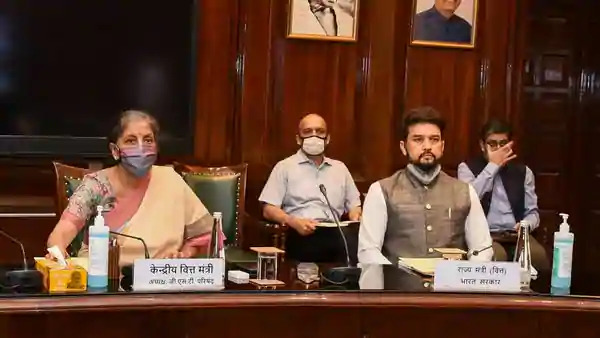The 41st Goods and Services Tax Council meeting was held today to address the compensation to reduce the revenue gap for the states on the backdrop of COVID-19 pandemic. The meeting was chaired by the Finance Minister of India, Nirmala Sitharaman. The meeting also saw the presence of union minister of state for finance and corporate affairs Anurag Thakur and finance minister of every state and Union Territories.
In the Goods and Services Tax imposed by the center on July 1st, 2017, the center had guaranteed any loss of revenue by the states for the first five years. This year due to the coronavirus outbreak the states were forced to go into lockdown for several weeks. Even now some states apply periodic lockdown every week to reduce the outbreak. Thus the cess collection has plunged in the last few months. The shortcomings of the revenue collection have been calculated assuming a 14 percent annual growth rate in GST collections by the states over the base year of 2015-16. According to the states, the center is “morally bound” to compensate and not paying would be “nothing but a betrayal.”
During the meeting, two options were put forward by the finance minister Nirmala Sitharaman. She also said that the states are given seven working days of time to decide which to choose.
The two options are:
- The states will be provided with a special window, in consultation with the RBI, to provide them ₹ 97,000 crores at a reasonable rate of interest. The states can return the money after five years from the collection of cess.
- The entire GST compensation gap of ₹ 235,000 crores of this year can be met by the states, in consultation with the RBI.
Therefore, if the states consider taking option 1, the states would borrow less, but the compensation entitlement of that state would be protected. So the states can either borrow less and get cess layer or borrow more and pay for that using cess.
The revenue secretary said that out if the ₹ 2.35 lakh crore shortfall of revenue collection in FY21, only ₹ 97,000 crore is due to the implementation of GST. COViD-19 pandemic was blamed for the rest of the shortcomings. The revenue secretary also read that in the time period from July to April 2020, a total GST compensation of ₹ 1.5 lakh crore is to be paid as there was hardly any GST collection during that time.
The states were given seven working days to decide which option they choose to go for. The finance minister also said that these options would be available only during the current year and next year during the GST council meeting, this situation would be reviewed. Also, she said that soon the committee would meet again to discuss the situation. She also said that the GST rates will not be increased.
The Attorney General’s opinion was that the compensation gap in the collection should not be met from the Consolidated Fund of India. He also suggested that compensation of cess collection can be extended beyond five years to meet the shortfall.

The decision of the center regarding the compensation was met by heavy criticism from the non-BJP ruled states. Punjab Finance Minister, Manpreet Badal said that the ministers of the opposition-led states sensed “severe trust deficit” and felt that the center was thrusting their solution on them, as reported by the Tribune.
After he attended the meeting to discuss the solution with the finance minister of India, where she gave two options to the states to choose from in seven working days, he said, “The meeting didn’t progress in a very cordial atmosphere I am afraid. There was a clear trust deficit. A solution is being thrust on us. That was the feeling we got. They are saying states can borrow and are not even mentioning their own constitutional commitment to pay GST compensation to states.”
Finance Minister of India, Nirmala Sitharaman also said, “Only the ‘Act of God’ may result in contraction of the economy this fiscal.” Citing COViD-19 pandemic as the ‘Act of God’. She added that the center would provide the states with further relaxation of 0.5% in states’ borrowing limit under the FRBM Act. She said, “The Central government will give a further relaxation of 0.5% in states’ borrowing limit under the FRBM Act as 2nd leg of Option 1. States can choose to borrow more, beyond expected compensation itself, since that is the injury caused by COVID-19.”
While other states might choose to go for the other option to get hard-wired compensation rather than going to the market to borrow more. For them, there is another option to choose from. She said, “Option was tailor-made considering that states can take a call depending on the compensation they expect to come.”
Once the states decide which option they would choose, and the arrangement is agreed by the council, the government can move on fast and clear the dues. The government also has the rest of the financial year ahead of them to take care of.

